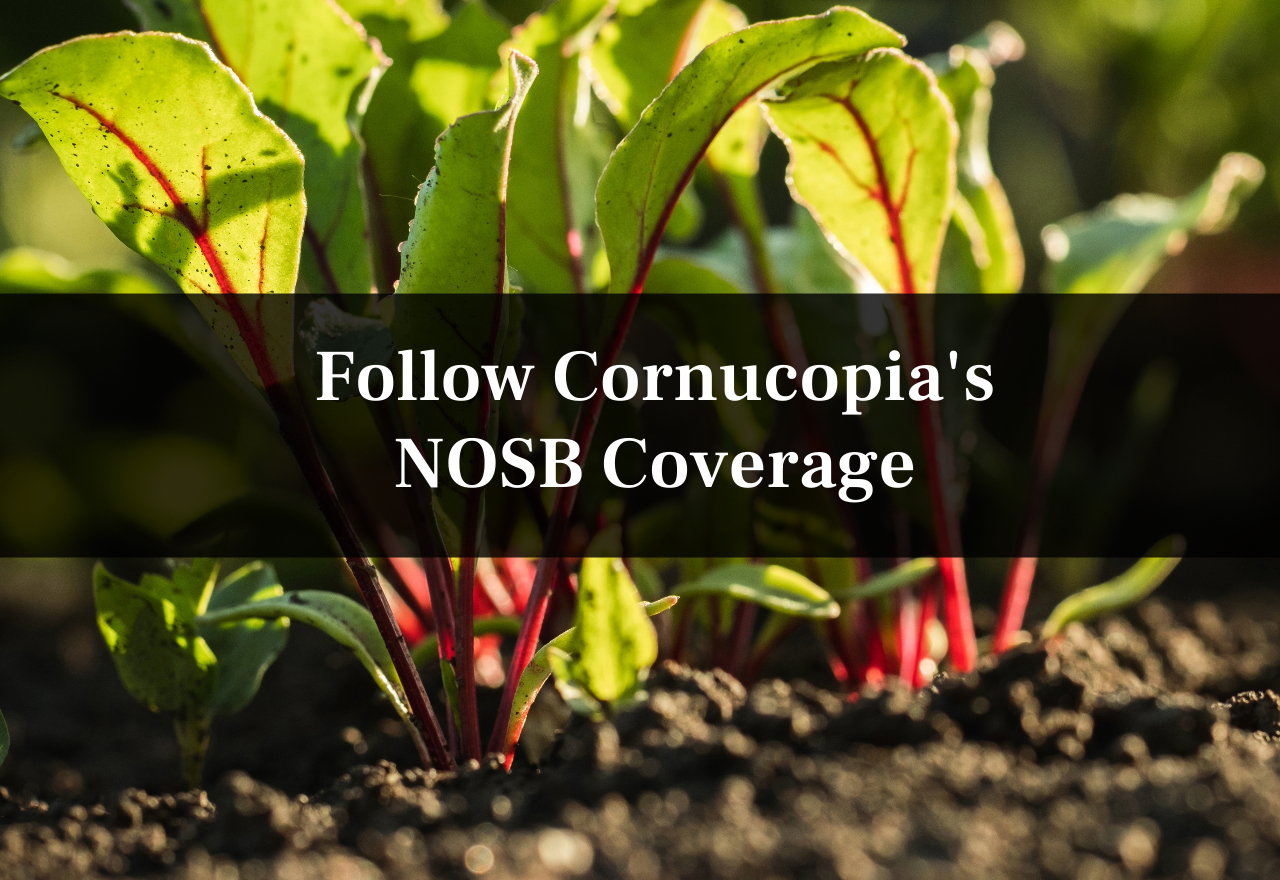Did you miss the recent National Organic Standards Board (NOSB) meeting in Providence, Rhode Island? Here’s your chance to catch up!
The NOSB is a federal advisory committee that makes recommendations to the National Organic Program (NOP) on organic materials and standards. The group of volunteers from different areas of the organic community meets twice annually to take public comment, discuss proposals, and review materials that are allowed (or disallowed) in organic production and handling.
The meetings are also a time for stakeholders to connect and discuss important issues in the organic marketplace.
The complete play-by-play notes from the spring 2023 NOSB meeting can be found on Cornucopia’s website. Here’s a summary of the highlights:
Oral Comments
The oral commenting period is a time for organic stakeholders to speak directly to the NOSB and the NOP. The oral comments for this round set a very high bar: more than ever before, the public and the NOSB seemed to be engaged in active conversations about a wide range of issues.
Many stakeholders came to speak out about the valid concerns they have about the organic marketplace. One theme from Spring 2023 meeting was revisited by many commenters: the problem of hydroponic production being allowed under the organic label. Some farmers noted how allowing hydroponics creates an unfair playing field for soil-grown producers, especially those producing crops like tomatoes or leafy greens which are a popular choice for hydroponic production.
Large groups of farmers also came to share their visions for a better future with the NOSB. Many noted that consumers do not understand the value of organic production and are confused or misled by propaganda surrounding marketing labels for food. These farmers asked both the NOSB and USDA to commit resources to education about the benefits of organic farming to the public as a whole.
Cornucopia agreed with many of the oral comments that touched on organic integrity in our oral comments as well.
Cornucopia has notes on the NOSB oral public comments on its website.
National Organic Program Report
Dr. Jennifer Tucker, Deputy Administrator for the National Organic Program, summarized the ongoing work of the NOP. Ongoing efforts from the NOP included their work to help roll out the Strengthening Organic Enforcement (SOE) rulemaking, which is nearing “enforcement stage” for the whole marketplace. Part of this includes new courses on the Organic Integrity Learning Center, which offers courses targeted toward organic certifiers (though anyone can access the materials). The NOP’s presentation summarizing their activities can be found here.
The other major topic of the day was the Transition to Organic Partnership Program (TOPP), a partnership program that over five years plans to provide technical assistance and wrap-around support for transitioning and existing organic farmers. Representatives from the Northeast TOPP partnership presented updates about their work to the NOSB and stakeholders.
On day two, the NOSB also received a report from the USDA’s Risk Management Agency (RMA). The presentation delved into the complicated world of crop insurance, and how crop insurance programs fit into organic production (and how they could be improved).
Rulemaking Update
During the meeting, the U.S. Department of Agriculture Under Secretary for Marketing and Regulatory Programs Jenny Lester Moffitt reported that the Organic Livestock and Poultry Standards has been finalized!
While not perfect, the finalized OLPS rulemaking is an important piece of “continuous improvement” under the organic seal. This new rule establishes more consistent standards for organic livestock, including poultry. We hope that OLPS will help to level the playing field for small and midsized producers, set limits on industrial-ag tactics, all while providing consumers with more transparency about their purchases.
NOSB Discussion
Apart from the NOSB’s evaluation of upcoming sunsets for substances on the National List, the NOSB tackled other issues that have been important to organic stakeholders.
Among the topics discussed were:
- Organic pork: The NOSB discussed how the market for organic pork could be made more viable and asked the community at large what barriers they see in organic pork production.
- Crop insurance: The NOSB engaged with the presentation from RMA to question how crop insurance could better address the needs of organic farmers. One of the conclusions from this discussion is that more data is needed to improve crop insurance, which should in turn encourage more organic transition.
- Organic transition issues: The NOSB discussed how the marketplace can improve support for organic transition. As it stands, many farmers are wary of taking the risk to spend three years transitioning (as the organic rules require) when the marketplace is uncertain.
- Efforts to deter fraud: Several discussion documents on the NOSB’s docket dealt with the issue of fraud detections and prevention. The NOSB discussed how to improve residue testing and how to identify specific locations so that organic products can be better traced. Cornucopia’s oral comments also touched on residue testing and deterring fraud.
- Annotations: During the closing discussion, the NOSB discussed the annotation process for National List materials (annotations often limit how substances allowed in organic production and handling can be used). Updating or even adding annotations has proved to be a cumbersome process. This needs to be better integrated, especially when it relates to the limited number of synthetic materials allowed in organic.
The next NOSB Meeting will be in April of 2024. Sign up for our eNews to stay connected and learn more about how you can impact the organic marketplace.


